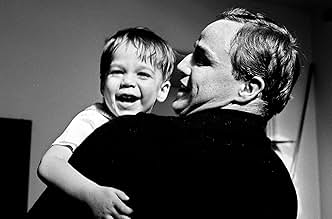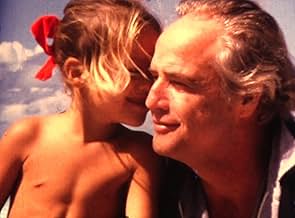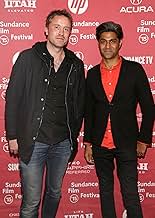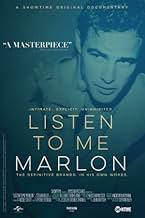AVALIAÇÃO DA IMDb
8,1/10
8,1 mil
SUA AVALIAÇÃO
Um documentário que utiliza centenas de horas de áudio gravadas por Marlon Brando ao longo de sua vida para contar a história da lenda do cinema.Um documentário que utiliza centenas de horas de áudio gravadas por Marlon Brando ao longo de sua vida para contar a história da lenda do cinema.Um documentário que utiliza centenas de horas de áudio gravadas por Marlon Brando ao longo de sua vida para contar a história da lenda do cinema.
- Direção
- Roteiristas
- Artistas
- Indicado para 1 Primetime Emmy
- 5 vitórias e 21 indicações no total
Marlon Brando
- Self
- (cenas de arquivo)
Stella Adler
- Self
- (cenas de arquivo)
- (não creditado)
Bernardo Bertolucci
- Self
- (cenas de arquivo)
- (narração)
- (não creditado)
Michael Borne
- Young Marlon Brando
- (não creditado)
Marlon Brando Sr.
- Self
- (cenas de arquivo)
- (não creditado)
Christian Brando
- Self
- (cenas de arquivo)
- (não creditado)
Dick Cavett
- Self
- (cenas de arquivo)
- (não creditado)
Connie Chung
- Self
- (cenas de arquivo)
- (não creditado)
Montgomery Clift
- Self
- (cenas de arquivo)
- (não creditado)
Francis Ford Coppola
- Self
- (cenas de arquivo)
- (não creditado)
Bette Davis
- Self
- (cenas de arquivo)
- (não creditado)
Anna Kashfi
- Self
- (cenas de arquivo)
- (não creditado)
Elia Kazan
- Self
- (cenas de arquivo)
- (não creditado)
Robert F. Kennedy
- Self
- (cenas de arquivo)
- (não creditado)
Martin Luther King
- Self
- (cenas de arquivo)
- (não creditado)
Sacheen Littlefeather
- Self
- (cenas de arquivo)
- (não creditado)
Dorothy Malone
- Self
- (cenas de arquivo)
- (não creditado)
- Direção
- Roteiristas
- Elenco e equipe completos
- Produção, bilheteria e muito mais no IMDbPro
Avaliações em destaque
This documentary is full of many bits and pieces from Brando's life and career. I found it all most fascinating, and agree it's a good documentary.
What I found less fulfilling was the choice to use a patchwork approach to its formal structure It jumped around quite a bit, skimming over surfaces; I would have preferred a more chronological, in-depth approach--but that's my own opinion.
For instance, Brando got a lot of "bad press flack" for his so-called "erratic behavior" in "Mutiny on the Bounty" and "Apacolypse Now." This documentary had an opportunity to clarify the controversy, but didn't.
What was a treat, though, was viewing live footage of Stellar Adler at work in the formative U.S. stages of teaching the "Method," along with samplings of Stanislavsky's initial philosophy on acting technique.
The inclusion of scene clips from Brando's various films were also engaging, though a number of his films were omitted (perhaps by not having the studios' approval). The reported clash between Brando's training and Chaplin's directing style was also not covered, only snippets from "A Countess from Hong Kong" were shown.
Finally, Brando's having a 3D image of his likeness was shown, but it wasn't made too clear exactly what he envisioned the final utilized product would be. Again, this documentary brought up many fascinating topics and then didn't really demonstrate their significance.
On leaving this film, I thought, "here's a topic that could be made into a larger, three-part work and probably still have much footage to spare."
What I found less fulfilling was the choice to use a patchwork approach to its formal structure It jumped around quite a bit, skimming over surfaces; I would have preferred a more chronological, in-depth approach--but that's my own opinion.
For instance, Brando got a lot of "bad press flack" for his so-called "erratic behavior" in "Mutiny on the Bounty" and "Apacolypse Now." This documentary had an opportunity to clarify the controversy, but didn't.
What was a treat, though, was viewing live footage of Stellar Adler at work in the formative U.S. stages of teaching the "Method," along with samplings of Stanislavsky's initial philosophy on acting technique.
The inclusion of scene clips from Brando's various films were also engaging, though a number of his films were omitted (perhaps by not having the studios' approval). The reported clash between Brando's training and Chaplin's directing style was also not covered, only snippets from "A Countess from Hong Kong" were shown.
Finally, Brando's having a 3D image of his likeness was shown, but it wasn't made too clear exactly what he envisioned the final utilized product would be. Again, this documentary brought up many fascinating topics and then didn't really demonstrate their significance.
On leaving this film, I thought, "here's a topic that could be made into a larger, three-part work and probably still have much footage to spare."
I am not the first to suggest that Marlon Brando was more interesting than the characters he played, including Stanley Kowalski and Terry Malloy. The new documentary, Listen to Me Marlon, takes three directors to do the acting legend justice. They do it well by searching hundreds of Brando's recordings and interviews to piece together a fascinating, unbiased look at his life.
They even have digitized versions of his head that they fit his voice to in a novel and slightly creepy fashion. The suggestion that he has come back from the grave is not far-fetched as the voice is authentic and the verbals those of a consummate actor who morphs into different voices given the circumstance.
Beyond Brando's observations about his roles such as in Lady from Shanghai, which he is ashamed of, are painful recounting about his daughter and son. His son murders her husband, serves 10 years while she subsequently commits suicide after several attempts. Brando's public reactions are sincerely remorseful that he couldn't have done more, especially for his troubled son.
But then, who's to know if the great actor is not acting? Such is the magic of his art that I would even suggest the artifice of his public persona. One thing is for certain, the great method acting teacher, Stella Adler, foresaw a world-class actor in her young student.
The glory and gloom of this famous man are all there. The clips from his performances are as fresh and exciting as ever. Those from his later successes such as Last Tango, Godfather, and Apocalypse Now are testimony to his inherent genius that as a fat man (think Orson Welles) he still leads the field (a comfort, no doubt, to such current geniuses as Daniel Day-Lewis).
Listen to Me Marlon is a seamless song to arguably the greatest actor who ever lived. He paid dearly for his successes and profligacies in equal measure.
Regardless of its occasionally tawdry subjects, this doc is for anyone interested in one of the few titans of the stage and screen.
They even have digitized versions of his head that they fit his voice to in a novel and slightly creepy fashion. The suggestion that he has come back from the grave is not far-fetched as the voice is authentic and the verbals those of a consummate actor who morphs into different voices given the circumstance.
Beyond Brando's observations about his roles such as in Lady from Shanghai, which he is ashamed of, are painful recounting about his daughter and son. His son murders her husband, serves 10 years while she subsequently commits suicide after several attempts. Brando's public reactions are sincerely remorseful that he couldn't have done more, especially for his troubled son.
But then, who's to know if the great actor is not acting? Such is the magic of his art that I would even suggest the artifice of his public persona. One thing is for certain, the great method acting teacher, Stella Adler, foresaw a world-class actor in her young student.
The glory and gloom of this famous man are all there. The clips from his performances are as fresh and exciting as ever. Those from his later successes such as Last Tango, Godfather, and Apocalypse Now are testimony to his inherent genius that as a fat man (think Orson Welles) he still leads the field (a comfort, no doubt, to such current geniuses as Daniel Day-Lewis).
Listen to Me Marlon is a seamless song to arguably the greatest actor who ever lived. He paid dearly for his successes and profligacies in equal measure.
Regardless of its occasionally tawdry subjects, this doc is for anyone interested in one of the few titans of the stage and screen.
We've been extremely lucky over recent years with a plethora of fantastic and visionary documentaries on a range of different subject matters. From Man on Wire, The Act of Killing through to last year's Virunga and Amy, documentary craftsmanship has really gone from strength to strength as filmmakers look at ways to tell stories and shine a light on their subjects in all new ways and Stevan Riley's Listen to Me Marlon is quite possibly the first documentary of its kind.
An unquestionably fascinating look into not only the life but the very mind of legendary screen actor Marlon Brando, Riley and his crew had the rare opportunity to unearth boxes upon boxes of recordings that Brando himself had made through his entire career. These tapes range from confessionals through to self-hypnosis works but no matter what they're labelled as there all an insight into the inner workings of a man that dealt from a very young age with inner demons and wants that Hollywood could not heal.
For any fan of Brando or really any fan of movie history, Listen to Me Marlon offers a once in a lifetime like chance to hear the game changing method actor speak openly about his life as a kid, as a budding star, as a reclusive island wanderer and later in life a man that held many regrets and unfortunately found himself apart of a number of tragedies that clearly affected his life unmeasurably. Some of the most fascinating and open revelations we hear from Brando include his thoughts on acting as merely a means to be able to live his life and his deep love for the island of Tahiti and how he saw that as a place that showcased the best of humanity.
Listen to Me Marlon is a fabulously constructed documentary and while it would've been nice in a way to hear from others involved in Brando's life what better way to hear about his story is there than hearing from the man himself? An historic figure of depth and emotional nuances, Listen to Me Marlon is a must watch for any fan of cinema and easily one 2015's best documentary features.
4 scanned talking heads out of 5
An unquestionably fascinating look into not only the life but the very mind of legendary screen actor Marlon Brando, Riley and his crew had the rare opportunity to unearth boxes upon boxes of recordings that Brando himself had made through his entire career. These tapes range from confessionals through to self-hypnosis works but no matter what they're labelled as there all an insight into the inner workings of a man that dealt from a very young age with inner demons and wants that Hollywood could not heal.
For any fan of Brando or really any fan of movie history, Listen to Me Marlon offers a once in a lifetime like chance to hear the game changing method actor speak openly about his life as a kid, as a budding star, as a reclusive island wanderer and later in life a man that held many regrets and unfortunately found himself apart of a number of tragedies that clearly affected his life unmeasurably. Some of the most fascinating and open revelations we hear from Brando include his thoughts on acting as merely a means to be able to live his life and his deep love for the island of Tahiti and how he saw that as a place that showcased the best of humanity.
Listen to Me Marlon is a fabulously constructed documentary and while it would've been nice in a way to hear from others involved in Brando's life what better way to hear about his story is there than hearing from the man himself? An historic figure of depth and emotional nuances, Listen to Me Marlon is a must watch for any fan of cinema and easily one 2015's best documentary features.
4 scanned talking heads out of 5
I loved it, a very interesting and original way to to know more about Marlon Brando's life
If the usual celebrity documentary too often strays into the realm of "Let's see how many famous friends we can find to say nice things about the subject", Listen to Me Marlon, by contrast, is one of the loneliest feeling films about a performer whose works were experienced by so many. Billing itself as comprised from "hundreds of hours" of audio diaries recorded by the man almost universally billed as 'the world's greatest actor', the film is ultimately only half Brando in Brando's own words, interspersing his introspective mumblings with interview and news footage from the actor's life for a more neatly rounded documentary.
With this in mind, it's frustrating that, for a film about the actor celebrated for introducing method authenticity to the big screen, director/editor Stevan Riley indulges in so much cinematic trickery and documentary cliché (you can count the number of transitions not marked by solemn footage of wind chimes rustling on one hand ). Riley particularly gets a kick out of the trope of Brando's digitized head (but with nary a shout out to Brando's posthumously recycled performance in Superman Returns!), even having this CGI rendition 'speak' many of Brando's audio diaries, making significant eye contact with the audience at meaningful moments. Brando himself would likely scoff at the tackiness of this 'ghost Brando', and, while it does add a mesmerizing visual dimension to the 'talking heads' genre (arr arr arr ), it feels overused by the end, particularly while accompanied by the film's distractingly overbearing musical score. Mercifully, Riley stops short of having Ghost Brando sing "Luck Be a Lady Tonight". Shudder.
However, the real draw of the film, the 'Brando on Brando' audio recordings, do not disappoint. Brando has, of late, become almost less famous for his iconic performances as his on-set belligerence (guzzling jars of peanut butter in between takes, reading his lines off a baby's diaper in Superman, or refusing to wear pants on set); here, he is firmly restored as a human being. The Brando we get here is far more earnest and sensitive than the shirt-tearing brute cinema would make him out to be: articulate (no cotton-mouthed mumbling here!), introspective, surprisingly witty, and desperate to have a meaningful impact on the world. Amidst the pontifications on the value and necessity of acting and scorn for the falsities of celebrity – rousing in themselves – there are some movingly raw and emotional moments to be found, as Brando ruminates on the disastrous ramifications of his abusive upbringing and the ripple effects in the tragic lives of his own children, as well as important coverage of his often forgotten work with the civil rights movement from the 1950s-1970s. But, there's warmth to be found amongst the solemnity, as hearing Brando wax poetic about the paradise he found in Tahiti is genuinely moving, and it's hard, by the end, not to feel like he deserved the happiness.
As the film dreamily tumbles through the consecutive stages of Brando's career, it's fascinating to hear him candidly respond to audience reactions to him see-saw from Beatles- level hysteria to condescending indifference and back again through the years (spoiler alert: actors actually are affected by mass criticism!). Riley interweaves compellingly nostalgic clips from some of the earlier works in Brando's career (The Men, Brando's amusingly cringeworthy Mexican in Viva Zapata, Julius Caesar) and the seminal works (A Streetcar Named Desire, On the Waterfront, The Godfather), and hearing Brando's stiltedly pretentious justification for straying into "lighter fare" in Guys and Dolls is just about worth the price of admission alone. Riley particularly devotes focus to the controversy of Mutiny on the Bounty, which Brando attributes both his love of Tahiti and his loss of public favour to, while hearing Brando and Francis Ford Coppola trade barbs about whose fault the disastrous shoot of Apocalypse Now was (amusingly, both try to take credit for Kurtz being mostly kept in shadow – Brando claiming it was his aesthetic take on the character, while Coppola snaps it was to hide how obese Brando had become) is a masterclass of parallel editing in itself.
Listen to Me Marlon may be flimsier than one would hope for such a rich, intimate opportunity – content-wise, there's nothing that couldn't be found in his IMDb biography ¬– but Brando's life and career are wild enough that it still makes for a highly compelling watch. Where the film truly excels is not in facts, but feelings, as Brando himself conveys passion, dry wit, and a voluminous loneliness like none other. If nothing else, Listen to Me Marlon is worth it for granting Brando the true performance of his career: himself – not an overeating, eccentric, reclusive genius, but a human being, vulnerable, flawed, and perpetually yearning to make a difference in himself and the world. Few would dispute it: he was a contender, and he really was something.
-7/10
With this in mind, it's frustrating that, for a film about the actor celebrated for introducing method authenticity to the big screen, director/editor Stevan Riley indulges in so much cinematic trickery and documentary cliché (you can count the number of transitions not marked by solemn footage of wind chimes rustling on one hand ). Riley particularly gets a kick out of the trope of Brando's digitized head (but with nary a shout out to Brando's posthumously recycled performance in Superman Returns!), even having this CGI rendition 'speak' many of Brando's audio diaries, making significant eye contact with the audience at meaningful moments. Brando himself would likely scoff at the tackiness of this 'ghost Brando', and, while it does add a mesmerizing visual dimension to the 'talking heads' genre (arr arr arr ), it feels overused by the end, particularly while accompanied by the film's distractingly overbearing musical score. Mercifully, Riley stops short of having Ghost Brando sing "Luck Be a Lady Tonight". Shudder.
However, the real draw of the film, the 'Brando on Brando' audio recordings, do not disappoint. Brando has, of late, become almost less famous for his iconic performances as his on-set belligerence (guzzling jars of peanut butter in between takes, reading his lines off a baby's diaper in Superman, or refusing to wear pants on set); here, he is firmly restored as a human being. The Brando we get here is far more earnest and sensitive than the shirt-tearing brute cinema would make him out to be: articulate (no cotton-mouthed mumbling here!), introspective, surprisingly witty, and desperate to have a meaningful impact on the world. Amidst the pontifications on the value and necessity of acting and scorn for the falsities of celebrity – rousing in themselves – there are some movingly raw and emotional moments to be found, as Brando ruminates on the disastrous ramifications of his abusive upbringing and the ripple effects in the tragic lives of his own children, as well as important coverage of his often forgotten work with the civil rights movement from the 1950s-1970s. But, there's warmth to be found amongst the solemnity, as hearing Brando wax poetic about the paradise he found in Tahiti is genuinely moving, and it's hard, by the end, not to feel like he deserved the happiness.
As the film dreamily tumbles through the consecutive stages of Brando's career, it's fascinating to hear him candidly respond to audience reactions to him see-saw from Beatles- level hysteria to condescending indifference and back again through the years (spoiler alert: actors actually are affected by mass criticism!). Riley interweaves compellingly nostalgic clips from some of the earlier works in Brando's career (The Men, Brando's amusingly cringeworthy Mexican in Viva Zapata, Julius Caesar) and the seminal works (A Streetcar Named Desire, On the Waterfront, The Godfather), and hearing Brando's stiltedly pretentious justification for straying into "lighter fare" in Guys and Dolls is just about worth the price of admission alone. Riley particularly devotes focus to the controversy of Mutiny on the Bounty, which Brando attributes both his love of Tahiti and his loss of public favour to, while hearing Brando and Francis Ford Coppola trade barbs about whose fault the disastrous shoot of Apocalypse Now was (amusingly, both try to take credit for Kurtz being mostly kept in shadow – Brando claiming it was his aesthetic take on the character, while Coppola snaps it was to hide how obese Brando had become) is a masterclass of parallel editing in itself.
Listen to Me Marlon may be flimsier than one would hope for such a rich, intimate opportunity – content-wise, there's nothing that couldn't be found in his IMDb biography ¬– but Brando's life and career are wild enough that it still makes for a highly compelling watch. Where the film truly excels is not in facts, but feelings, as Brando himself conveys passion, dry wit, and a voluminous loneliness like none other. If nothing else, Listen to Me Marlon is worth it for granting Brando the true performance of his career: himself – not an overeating, eccentric, reclusive genius, but a human being, vulnerable, flawed, and perpetually yearning to make a difference in himself and the world. Few would dispute it: he was a contender, and he really was something.
-7/10
Você sabia?
- CuriosidadesA documentary made entirely out of archive footage and Marlon Brando's own words from recordings, confessionals, and self hypnosis.
- Citações
Marlon Brando, Himself: Everything that you do - make it real as you can. Make it alive. Make it tangible. Find the truth of that moment.
- ConexõesFeatures Luzes da Cidade (1931)
- Trilhas sonorasInfra 1
Written by Max Richter
Performed by Max Richter, Louisa Fuller, Natalia Bonner, Nick Barr (as Nick Carr), Ian Burdge and Chris Worsey
Principais escolhas
Faça login para avaliar e ver a lista de recomendações personalizadas
- How long is Listen to Me Marlon?Fornecido pela Alexa
Detalhes
Bilheteria
- Faturamento bruto nos EUA e Canadá
- US$ 425.831
- Fim de semana de estreia nos EUA e Canadá
- US$ 30.068
- 2 de ago. de 2015
- Faturamento bruto mundial
- US$ 516.337
- Tempo de duração1 hora 43 minutos
- Cor
- Proporção
- 1.85 : 1
Contribua para esta página
Sugerir uma alteração ou adicionar conteúdo ausente








































